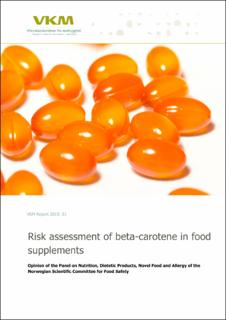| dc.contributor.author | Meltzer, Helle Margrete | |
| dc.contributor.author | Holven, Kirsten Bjørklund | |
| dc.contributor.author | Holvik, Kristin | |
| dc.contributor.author | Løvik, Martinus | |
| dc.contributor.author | Frølich, Wenche | |
| dc.contributor.author | Frøyland, Livar | |
| dc.contributor.author | Haugen, Margaretha | |
| dc.contributor.author | Strand, Tor A | |
| dc.contributor.author | Tell, Grethe S. | |
| dc.contributor.author | Iversen, Per Ole | |
| dc.date.accessioned | 2023-01-11T10:44:15Z | |
| dc.date.available | 2023-01-11T10:44:15Z | |
| dc.date.created | 2017-10-31T09:42:03Z | |
| dc.date.issued | 2015 | |
| dc.identifier.citation | Meltzer, H. M., Holven, K. B., Holvik, K., Løvik, M., Frølich, W., Frøyland, L., ... & Iversen, P. O. (2015). Risk assessment of beta-carotene in food supplements. Scientific opinion of the Panel on Nutrition, Dietetic Products, Novel Food and Allergy. VKM Report. | en_US |
| dc.identifier.isbn | 978-82-8259-155-3 | |
| dc.identifier.uri | https://hdl.handle.net/11250/3042663 | |
| dc.description.abstract | Beta-carotene is a provitamin, i.e. a precursor of vitamin A (retinol), which is classified as an essential nutrient for humans. Beta-carotene is one of many carotenoids found in plants, fungi and bacteria. Carotenoids are therefore predominantly obtained through foods of plant origin or food supplements. Carrots contribute approximately half of the total beta-carotene intake in the Norwegian diet, followed by mixed frozen vegetables, tomatoes, fruits and berries. VKM emphasises that this opinion on upper level (UL) for beta-carotene addresses beta-carotene in food supplements only. Beta-carotene from regular foods such as vegetables and fruits is not considered to be a health concern. In 2002, the Scientific Committee on Food (SCF) established a tolerable upper intake level (UL) for vitamin A (SCF, 2002). However, the SCF opinion covers only retinol compounds (various forms of vitamin A). The bioconversion of carotenoids to vitamin A in the body is well regulated and therefore only intake of vitamin A has been considered relevant for vitamin A toxicity (Blomhoff et al., 2003; EFSA, 2008). The Norwegian Food Safety Authority is considering whether beta-carotene should be regulated separately from retinol compounds. | en_US |
| dc.language.iso | eng | en_US |
| dc.publisher | Norwegian Scientific Committee for Food Safety (VKM) | en_US |
| dc.relation.ispartof | VKM Report | |
| dc.relation.ispartofseries | VKM Report; | |
| dc.relation.uri | https://vkm.no/download/18.2994e95b15cc54507161546f/1498143188656/e967639e8a.pdf | |
| dc.title | Risk assessment of beta-carotene in food supplements. Scientific opinion of the Panel on Nutrition, Dietetic Products, Novel Food and Allergy | en_US |
| dc.type | Research report | en_US |
| dc.description.version | publishedVersion | en_US |
| dc.rights.holder | Norwegian Scientific Committee for Food Safety | en_US |
| dc.subject.nsi | VDP::Landbruks- og Fiskerifag: 900 | en_US |
| dc.source.pagenumber | 110 | en_US |
| dc.source.issue | 2015:01 | en_US |
| dc.identifier.cristin | 1509154 | |
| cristin.unitcode | 217,7,6,0 | |
| cristin.unitname | Norsk hotellhøgskole | |
| cristin.ispublished | true | |
| cristin.fulltext | original | |
